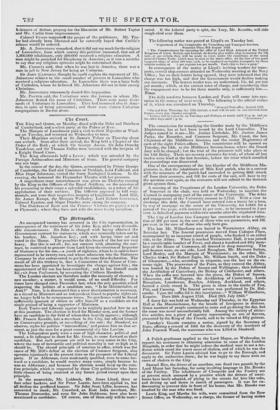Cbr a-Tett - 00E4.
An unexpected vacancy has occurred in the City representation, in consequence of the retirement of Sir John Key, under very discredit- able circumstances. Sir John is charged with having obtained the Government contract for stationery, which was nominally taken out by his brother, Mr. Jonathan Key ; and with having since sat and voted in the House. The penalties for this breach of the law are very heavy. But this is not all ; for, nut content with obtaining the con- tract, he contrived to procure from Lord Grey the situation of Inspector of Stationery for his son,—a youth of eighteen, whom he is said to have represented to be twenty-two, and whose admission into the Stationers Company he also endeavoured to get by the same false declaration. The result of all this trickery is, that a Committee of the House of Com- mons has been appointed to investigate the charges against him ; the appointment of his son has been cancelled; and be has himself made . his exit from Parliament, by accepting the Chiltern Hundreds.
The London electors are therefore under the necessity of choosing a new member; a matter, it would seem, of no small difficulty. For times have changed since December last, when the only question asked respecting the politics of a candidate was, " Is he Ministerialist, or And?" Now, it is discovered that a nicer discrimination is necessary, as a friend to Ministers and an independent friend to popular rights are no longer held to be synonymous terms. No gentleman could be found sufficiently ignorant or obtuse to offer himself as a candidate on the single ground of being a supporter of Ministers.
Both Tories and Liberals appear to be mightily puzzled how to act at this juncture. The election is fixed for Monday next, and the former have no candidate in the field of whom they heartily approve; although Mr. Francis Kemble, late a merchant in the City, has offered himself on Conservative grounds, or something of the sort : the Standard., we observe, styles his politics "intermediate," and praises him on that ac- count, as just the man for a great commercial city like London. The Independent party want a man of high character, political and moral, a fit colleague in short for Mr. Grote, to come forward as their candidate. But such persons are said to be very scarce in the City, where the tone of mercantile and political morality is not so high as it should be. The absurd principle of rotation in office, which was the cause of Mr. Hill's defeat at the election of Common Sergeant, also operates injuriously at the present time on the prospects of the Liberal party. if an Alderman, even moderately qualified, were to come for- ward as a candidate, he would receive many votes, simply because he was an Alderman ; and because his election would keep up the rota- tion principle, which is supported by those City politicians who have little chance of being returned at any future period except upon that principle. In the meanwhile, Mr. Lubbock, Mr. Jones Lloyd, three or four other bankers, and Sir Peter Laurie, have been applied to, but all decline the proffered honour. Sir John Scott Lillie, however,• has consented to stand; Mr. Crawford, an East India merchant, Mr. Thomas Duncombe, and even Sir John Hobhouse, have also been mentioned as candidates. Of course, one of them only will be nom:-
tuned. if the Liberal party is split, the Tory, Mr. Kemble, will ride rough-shod over them.
























 Previous page
Previous page